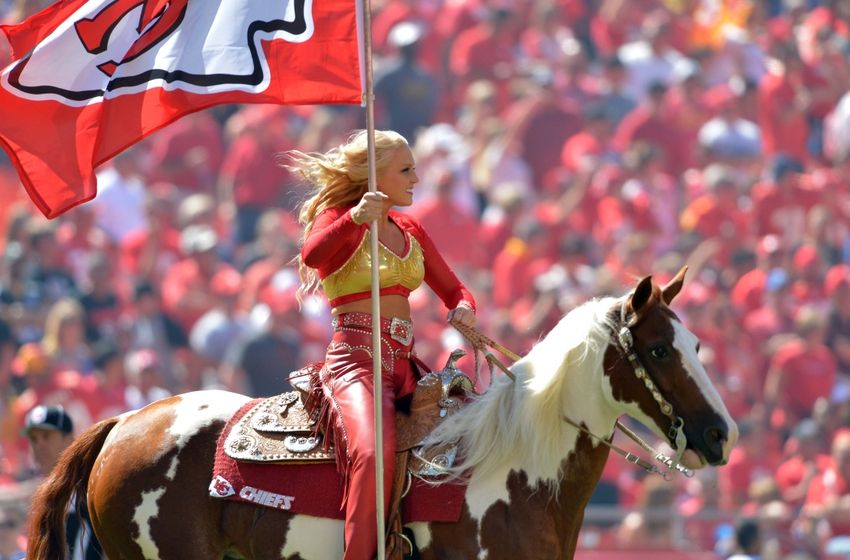
- Details
- By Andrew Kennard
KANSAS CITY, Mo. — The Kansas City Chiefs announced Monday that the football team will retire its mascot, a horse called “Warpaint” that would ride across the stadium with a cheerleader on its back each time the Chiefs scored. When the team played at Municipal Stadium from 1963-1971, a man wearing a Native headdress rode Warpaint, according to the Kansas City Star.
“We just feel like it’s time to retire Warpaint. A lot of reasons for that, but we just feel like it’s the right thing to do,” Chiefs president Mike Donovan said in a press conference. “So Warpaint won’t be running at Arrowhead anymore.”
Want more Native News? Get the free daily newsletter today.
In August 2020, the Chiefs banned fans from wearing Native headdresses and “any American Indian-themed face paint.” They have also required fans to perform the “Arrowhead Chop” cheer with a closed fist instead of an open hand, according to The New York Times.
The Heart of America Indian Center in Kansas City said in a Facebook post that the Chiefs should also change their name, saying that “no longer using a race of human beings as a mascot is also the right thing to do.”
“They're just kind of, I think, trying to placate the community at this point. How much racism are we going to tolerate?” Gaylene Crouser (Standing Rock Sioux Tribe), the executive director of the center, told NPR.
The Chiefs began consulting with their Native American Working Group in 2014, which the Chiefs said has guided their Native American Heritage Month Games, ceremonial blessing of the drum and the four directions of Arrowhead Stadium. Donovan said the Chiefs will continue working with the group, which includes Native Americans from tribes located in Oklahoma and Kansas, to “educate and create awareness.” He added that the group takes pride in the blessing of the drum.
“The American Indian Community Working Group respects the diverse perspectives that exist in Indian Country on broadly addressing the mascot issue in our nation,” the working group’s mission statement reads. “We recognize the opportunity to engage in a cross-cultural consultation and dialogue with the Kansas City Chiefs in hopes of facilitating a process that – over time – can lead to a cultural change in disrespectful behavior seen at times by some fans at NFL games… The consultation in which we are engaging is part of an ongoing process that we hope can serve as a model to be implemented by other teams in other communities.”
‘Why it’s important’
The National Congress of American Indians (NCAI) First Vice President Aaron Payment said the Chiefs’ retirement of their mascot is a “move in the right direction” but doesn’t go far enough. Payment said that cheers like the Arrowhead Chop lead to fans making derogatory remarks about Native Americans.
“The Kansas team may think they’re making a good faith effort, and it is appreciated,” Payment, who is also Tribal Chairperson of the Sault Ste. Marie Tribe of Chippewa Indians, told Native News Online. “But it doesn’t fix the problem, because it doesn’t address the unintended consequence of what happens on the football field. And I would challenge the Chiefs to consider picking another race to honor. And they won’t be able to, and when they’re forced to consider that question, then they realize why it’s important.”
Donate today to help us uplift Native Voices, Native Perspectives, and Native News.
Payment also cited the American Psychological Association's call in 2005 for all Native American mascots, symbols, images, and personalities to be retired based on research about the negative effects of Indigenous-themed mascots on Native Americans. In a 2020 resolution, the NCAI said the Chiefs’ mascot and associated names, symbols and behaviors “permeate every facet of society in and around Kansas City.”
“Kansas City Native youth are subjected to advertisements on radio, TV, and marketing displays in every grocery store, including pork chops advertised as the ‘tomahawk chop’ and ‘Can’t Stop the Chop’ ads featuring football fans singing the stereotypical song and doing the tomahawk chop,” the NCAI said in the resolution. “Additionally, fast food advertising features statements that they will ‘feed the tribe,’ and a local Sonic’s sign stating, ‘KC CHIEFS’ WILL SCALP THE RED****S FEED THEM WHISKEY SEND – 2 – RESERVATION,’ add to dehumanizing propaganda our youth are bombarded with, leading to lowered self-esteem and self-worth, and potentially leading to increased violence against American Indian youth.”
According to NCAI, 1,874 schools and 996 school districts have one of the five most common “Native-themed” mascots, and 42 schools have changed their “Native-themed” mascots so far this year.
More Stories Like This
Native News Weekly (August 25, 2024): D.C. BriefsUS Presidents in Their Own Words Concerning American Indians
Haaland Meets with Southern New Mexico Law Enforcement on Public Safety Priorities
This Day in History – Dec. 26, 1862: 38 Dakota Men Executed by Order of Abraham Lincoln
Merry Christmas 2025
Help us defend tribal sovereignty.
At Native News Online, our mission is rooted in telling the stories that strengthen sovereignty and uplift Indigenous voices — not just at year’s end, but every single day.
Because of your generosity last year, we were able to keep our reporters on the ground in tribal communities, at national gatherings and in the halls of Congress — covering the issues that matter most to Indian Country: sovereignty, culture, education, health and economic opportunity.
That support sustained us through a tough year in 2025. Now, as we look to the year ahead, we need your help right now to ensure warrior journalism remains strong — reporting that defends tribal sovereignty, amplifies Native truth, and holds power accountable.
 The stakes couldn't be higher. Your support keeps Native voices heard, Native stories told and Native sovereignty defended.
The stakes couldn't be higher. Your support keeps Native voices heard, Native stories told and Native sovereignty defended.
Stand with Warrior Journalism today.
Levi Rickert (Potawatomi), Editor & Publisher

